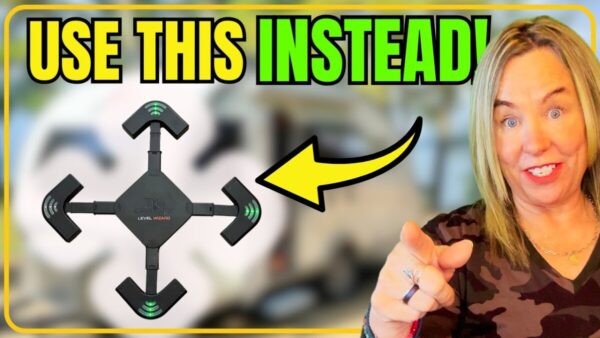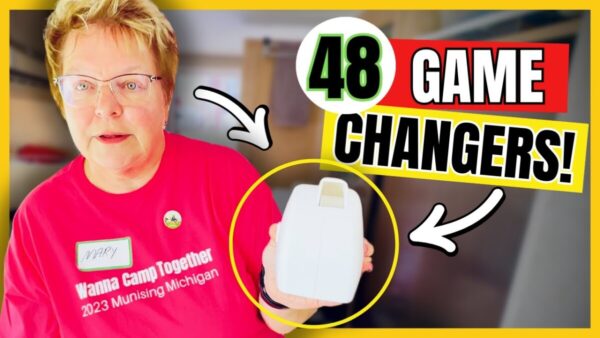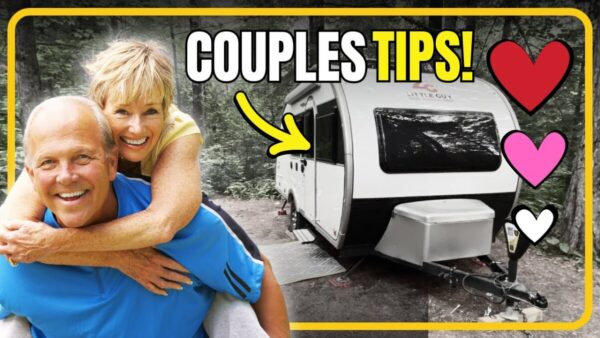These 12 RV camping tips for beginners will help you avoid making some of the rookie mistakes I made. Because if you are an RV newbie… the truth is you don’t know what you don’t know. I know because four years ago when I bought my first RV I was clueless.
As I look back I have learned a lot about the best way to RV and how to properly do things and at times it was stressful. I am still learning but today now that I have the experience I am more confident and am loving every camping moment!
I want to help you prepare for your first camping trip by mastering RV camping 101. Following are the best beginner RV camping ideas and tips so you can get out there and create exciting lifetime memories.
12 Best RV Camping Tips for Beginners
1. Never Exceed Your Vehicle’s Towing Capacity
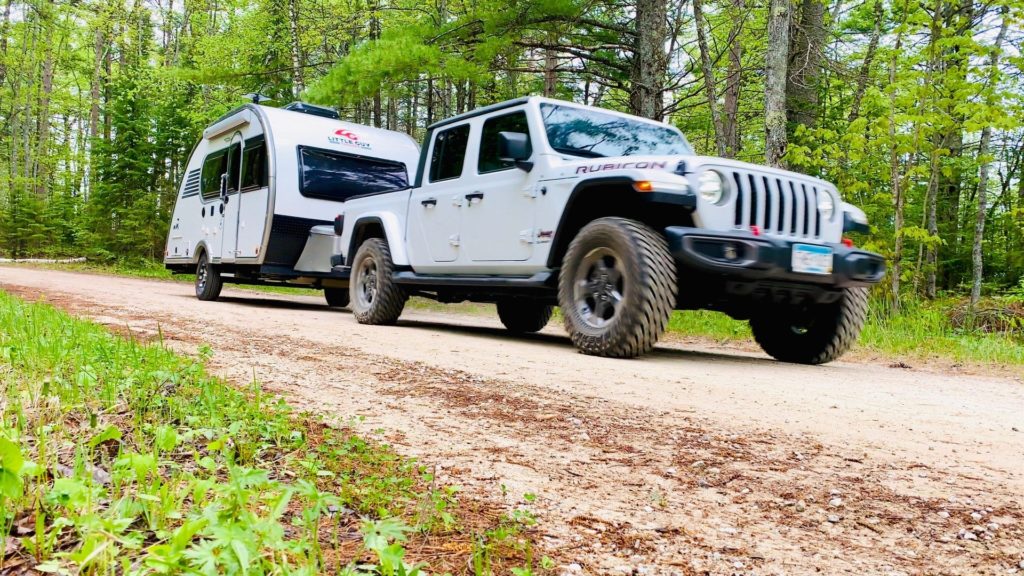
Your vehicle’s towing capacity is the weight it can safely tow while towing your RV down the road. You need to know what your tow vehicle’s towing capacity is and never exceed what the manufacturer states it can safely tow.
If your RV is heavier than what your tow vehicle is capable of handling this could cause transmission problems to your vehicle and it is also more difficult to control the vehicle.
This may be the most important safety tip for RV camping beginners.
2. Never Exceed Your Tow Vehicle’s Payload Capacity
Your vehicle’s payload capacity is the maximum amount of weight you can safely add to its cargo area. You need to know what this weight is and never pack more things in it that exceed its payload capacity.
When you know your payload capacity number use this information when packing your RV camping gear in your tow vehicle and make sure all items such as a grill, kayak, firewood, generator, and other camping gear do not exceed this number.
3. Buy Your Essential RV Camping Gear Before First Trip
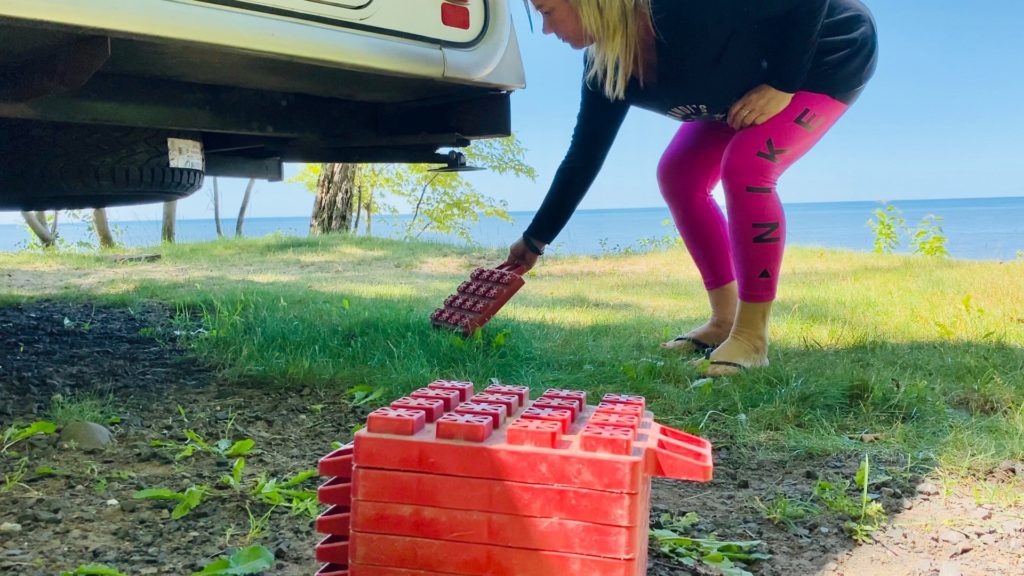
There is certain essential RV gear you will need to buy before your first camping trip. This is the gear you need to set up and take down your RV at the campsite.
RV camping essentials for beginners include items such as a sewer hose to empty your black tank and disposable gloves so you do not touch the sewer hose and other things at the dump station.
If you are uncertain what are the essentials for RV camping then you need to watch this video because it will tell you exactly what you need including a handy checklist.
4. Do Not Waste Money on Unnecessary Gear
Before your first RV camping trip, it will be tempting to purchase more than just the essentials. However, it is better to buy these items after you have been on one or two camping trips.
After a few trips, you will have a better idea of exactly what you need and more importantly what you don’t need. This will save you money on things you will never use or have the space for.
And remember less is more especially in small spaces.
5. Avoid Crowded Campgrounds
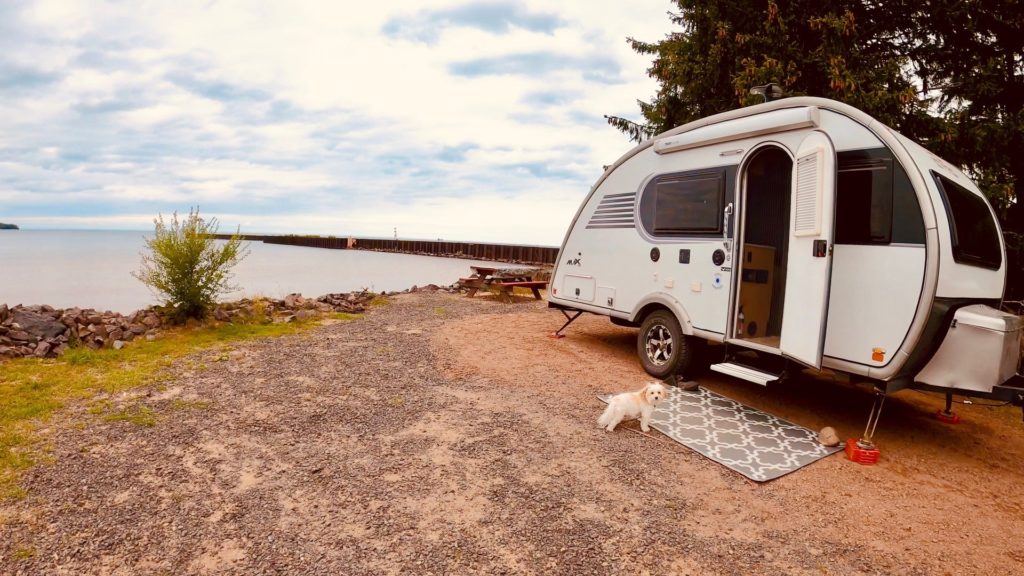
The best RV trips for beginners do not happen at crowded campgrounds. Rather it is best to spend your first night in your driveway or at a nearby spot that is not crowded and congested with other RVs and people.
This way you will not be distracted so you can devote 100% of your time and focus to getting acquainted with your new RV. You are going to really appreciate this time.
Besides being really crowded another reason to avoid a campground for your first camping trip is many of them do not have good cell signal reception. Wherever you go you want to make sure you will have a good cell signal because as you are setting up your RV for the very first time you are going to have questions and being able to Google your question and get an answer or watch a YouTube video to see how something is done is going to save you a lot of frustration.
6. Understand Campground Amenties
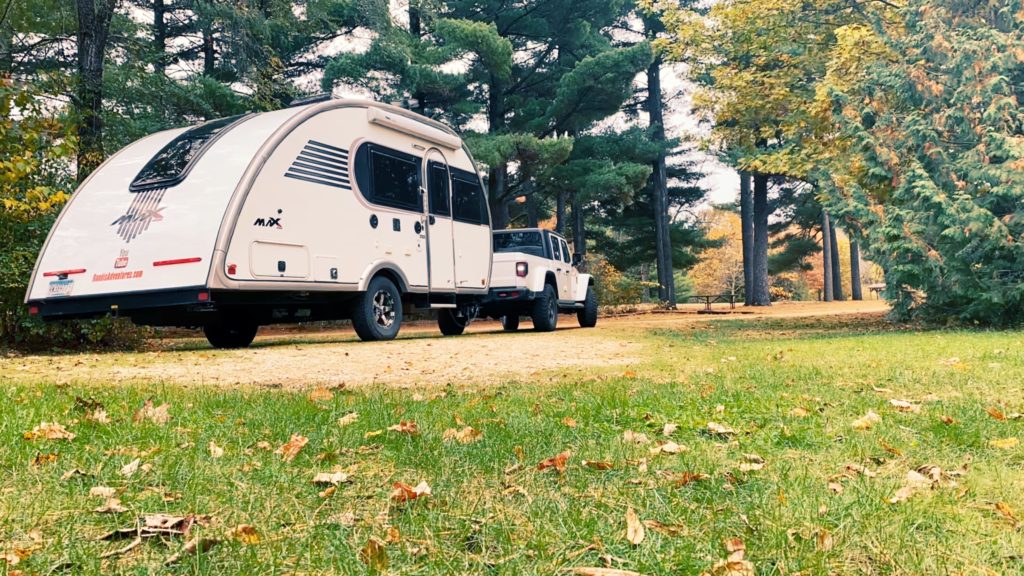
First thing you need to know about campgrounds is each one is unique and has different amenities. And a big RV camping tip for beginners is to never assume you will have full hookups.
RV parks typically have all three hookups: water, sewer, and electric. But if you are camping at a State Park more than likely they will only have electric hookups. I don’t care if I have any hookups but as a first-time RV camper, having electric hookups is going to be important to you so you don’t have to worry about things like your RV battery levels.
The next thing you need to know is every campsite at every campground is different too.
Some campsites are big enough to fit a large motorhome on and some are just big enough to fit a small 18’ camper on like my Little Guy Max. When making a campsite reservation be sure to look at the maximum length of RV the site can accommodate. The last thing you want to do is pull up to the campsite and find out you can’t fit on it.
Also, most campsites are “back in” which means you need to back your RV into it. But there are some campgrounds that have a few “pull-through” sites which mean just that. You pull your RV into the campsite and you do not need to back it up.
You are going to be excited and have a lot on your mind so finding a pull-through campsite might be best so you don’t have the additional worries of backing up on your first trip. Use your best judgment.
7. Learn How to Setup and Take Down Your RV at the Campsite
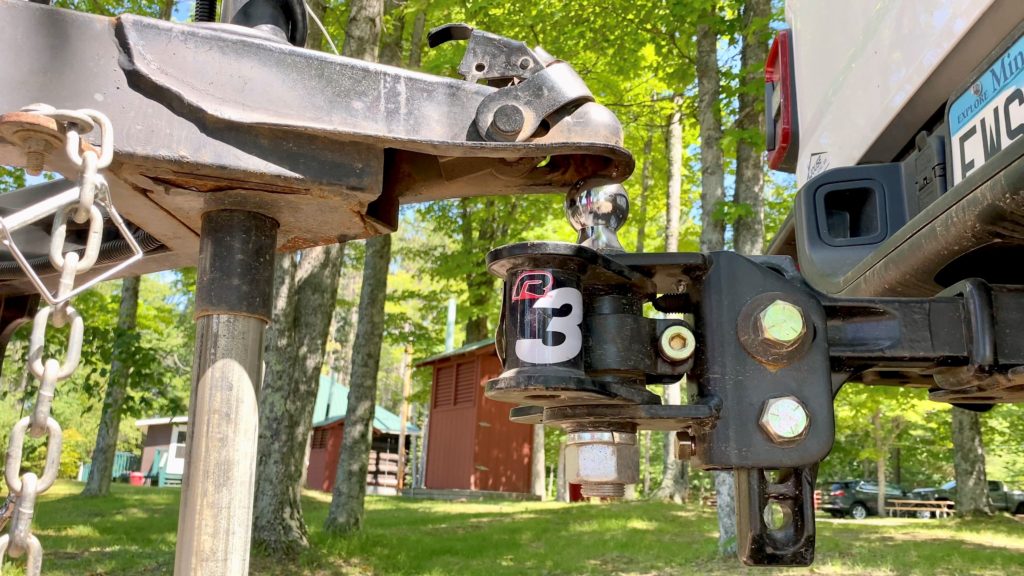
When you bought your RV hopefully someone talked you through the RV setup and takedown process. But as a first-time RVer, this is so much information to fully digest at one time. So don’t make the mistake of thinking you will remember everything.
I found watching someone perform these steps made it easier for me to remember them. The best way to do this is to watch a YouTube video or two so you can visually see how things are done.
I’m talking about things like how to properly level your RV, and how to dump your black tank for the very first time.
And another important part of this process is hitching and unhitching your RV. You need to make sure you know how to properly hitch your RV back up to your tow vehicle when you’re ready to leave because doing this wrong could be a disastrous mistake.
The best RV camping tip for beginners is to have both an RV setup and an RV take down checklist. I certainly depend on mine. There is more information about this coming up!
8. Verify Cords and Hose Can Reach Hookups Before You Unhitch
When you get to your campsite be sure to verify all of your hoses and cords will reach the hookup before you unhitch your RV from your tow vehicle.
Not doing this is a common mistake both newbies and seasoned RVer make so I guarantee you will make this mistake at least once even after you know better.
You may find that your electric cord is just one or two inches away from reaching the electric hookup. So now you have to restart the whole setup process again. Yes, this can be annoying when it happens so always make sure your cords and hoses can reach before you unhitch your RV.
9. Ask for Help When You Need It
Do not be afraid to ask for RV camping help.
Over the course of more than 100 camping trips I have learned that RVers are the nicest people and 99% of them are willing to help you out if you have a question or need help with something.
One time I was having a hard time backing my RV up into my campsite and there were several people that came over to help me without me even asking.
So never be afraid to ask for help and be a nice person and help someone out when you see they need help.
10. Beware of Campground Etiquette
This tip is one I was clueless about for a while. I did not know about the unwritten campground etiquette rules.
Yes, there are campground etiquettes that aren’t written anywhere but trust me every seasoned RVer knows and follows these and if you don’t you are going to get some strange looks.
The biggest unwritten campground etiquette most first time RVers are clueless about is to not walk through other people’s campsites. It may be a shortcut to get somewhere but just do not do this because people really don’t like it.
Another unwritten rule which doesn’t happen as often today because campgrounds are usually packed but if you do find yourself in a situation where there are many campsites available do not pick up that is not right next to someone else. If there is an option to give an existing camper some space, give it to them.
Also, always leave your campsite clean even if it wasn’t perfectly picked up when you arrived. If there are beer bottles or other garbage in the fire pit pick it up and properly dispose of it.
11. Make Your Reservations Now
You are going to thank me when I tell you about tip #11 so you avoid being stranded without a camping spot.
Today more than ever campgrounds are packed so you will want to make your season camping reservations now. The difference between getting reservations four years ago to today has absolutely become more challenging. Every day that goes by means fewer campsites are available to reserve.
12. Use RV Checklists
Every RV beginner needs to use checklists to avoid making unnecessary rookie mistakes.
The most important RV checklists are setup and teardown lists. Because there are so many moving parts this is the best way for you to avoid frustration, unnecessary damage, and issues down the road.
An RV packing list is another great idea as a checklist that will help you from forgetting something important you need to pack for your next trip.
While using RV checklists may be one of the best RV camping tips for beginners they are also great for veteran RVer because they take the guesswork out of wondering… did I forget to do something when I arrived or before I departed the campsite?
Watch this RV checklist video to learn about the RV checklists I recommend and how to get yours.

